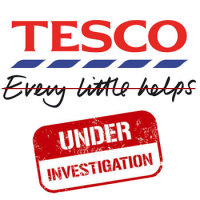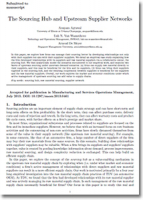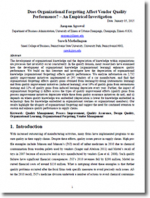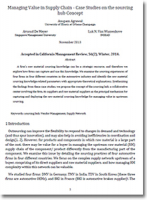The Sourcing Hub and Upstream Supplier Networks
In this paper, we explore how firms can manage their sourcing better by developing relationships not only with their suppliers but also with their suppliers' suppliers.
In this paper, we explore how firms can manage their sourcing better by developing relationships not only with their suppliers but also with their suppliers’ suppliers.
We detail an empirical case study explaining how the rm developed relationships with its suppliers and raw material suppliers via a collaborative center, the sourcing hub.
We then analytically model the scenarios encountered in our empirical work, and examine two facets of upstream sourcing under uncertain demand scenarios: (a) firms can supply raw material directly to their suppliers, and this may be beneficial for the rm and its suppliers, (2) firms can bring their suppliers together at the sourcing hub, and the resulting cooperation between suppliers is beneficial for the suppliers and the raw material suppliers.
Overall, our work explores the market and economic conditions under which active management of upstream sourcing can add value to supply chains.
Introduction
Sourcing policies are an important element of supply chain strategy and can have short-term and long-term effects on rm profitability. In the short term, they can effect purchase costs, delivery costs and costs of rejection and rework. In the long term, they can effect warranty costs and product life cycle costs, with further effects on a firm’s prestige and market share.
In most firms, organizational subsystems and processes related to suppliers are focused on the rm and its immediate suppliers. However, we believe that with an increased focus on core business activities and the outsourcing of non-core activities, firms have slowly distanced themselves from some of the value in their supply network (like upstream raw material sourcing).
For example, in some contexts, like that of an automotive rm, a large number of direct suppliers of the rm may buy their raw materials from the same sources. In this scenario, building close relationships with suppliers’ suppliers may be valuable.
What’s Related




Favorites





